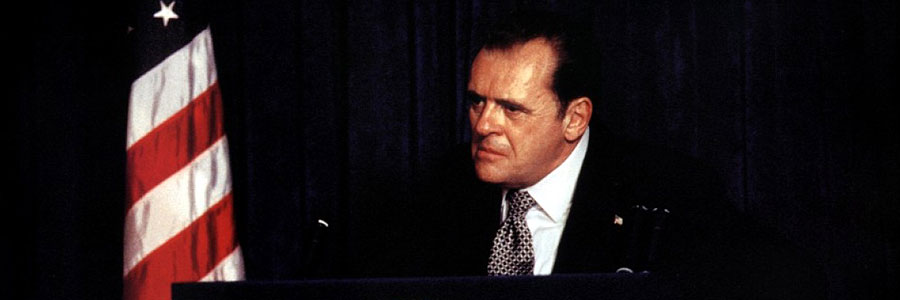
Nixon

NIKON (MOVIE)
Buena Vista Pictures
Original release: December 22nd, 1995
Running time: 192 minutes
Director: Oliver Stone
Writers: Stephen J. Revele, Christopher Wilkinson, Oliver Stone
Composer: John Williams
Cast: Anthony Hopkins, Joan Allen, Powers Boothe, Ed Harris, Bob Hoskins, Paul Sorvino, J.T. Walsh, James Woods
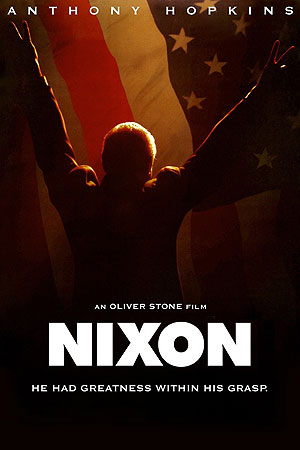
It’s an ancient theme but power corrupts is still poignant today. There are many interpretations of this theme throughout art, film and novels in particular. What is it that fascinates us about people who become evil by gaining power? Seeing them fall from grace contains an element of schadenfreude, however, it’s the characters that become corrupt that intrigue us the most. We’re enraptured with villains, especially when they believe they’re doing the right thing.
Oliver stone, a director that caused controversy with both JFK (1992) and Natural Born Killers (1994) continued raising eyebrows and finger-wagging when he announced that he would be creating a biopic about disgraced president Richard Milhous Nixon. JFK divided critics and audiences alike as Stone fictionalised and speculated with facts. He later caused an outrage with Natural Born Killers after a series of killings were apparently influenced by the film.
Nixon was met with a mixed response. Nixon haters weren’t given an outright villain. Nixon supporters were offended that Stone presented him as a power-obsessed alcoholic with mother issues. What Stone gave us what a complex character – a fictionalised version of Nixon. The problem with many biopics is that they try and present caricatures in the way of a good impersonation. Stone avoids these trappings and experiments with narrative and style to give us his interpretation of the much-hated Nixon.
The Watergate scandal was Nixon’s downfall and it’s the night of the break-in that starts the film. We then flash forward to Nixon (Anthony Hopkins) alone, disgraced, pill-popping and drinking. His chief of staff, Alexander Haig (Powers Boothe) arrives to give him more of the secret tapes he used to record meetings with his staff. As he listens, we flash back to key discussions, revealing Nixon’s paranoia and complicity in covering up the White House’s involvement with the Watergate burglary. Senior members of staff John Erlichman (J.T. Walsh) and H.R. Haldeman (James Woods) try their best to counsel the paranoid president whilst trying to save their own skin but as we delve deeper into Nixon’s life, it becomes clear it’s every man for himself.
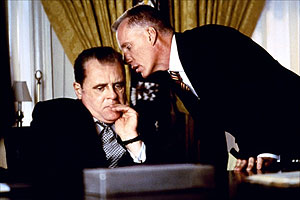
I was introduced to Stone’s work when I watched JFK with my parents. I admit I was pulled into his conspiracy theories and I was arrested by the visuals. Stone developed a visually aggressive style with JFK. He mixed different film stocks, including Super-8, 18mm and 35mm to create a mash-up, Cubanistic style of filmmaking. He adopted a faster editing style for Natural Born Killers which was exhilarating for some, irritating for others. With Nixon, Stone somewhat slowed-down his edit, though he still blended different stocks. He was taking his time with this film and wanted us to engage with a dark character.
The film’s major influence is Orson Welles’ Citizen Kane (1941). Both are twisted narratives about men from poor backgrounds that rise to power and become corrupt. Stone even uses a March on Time sequence to cover Nixon’s career as a senator. The opening shot of the White House is obviously referencing Xanadu, the mansion/tomb in which Kane secluded himself from the world.
When Hopkins was cast as Nixon, there was a lot of speculation about his likeliness to the former president. Stone eschewed this in favour of a strong performance as he wasn’t after an impersonation. Hopkins delivers one of the finest performances of his career and manages to utilise Nixon’s speech and mannerisms that echo the real Nixon but creates a dark character that Hopkins makes his own.
A whole host of cameos from Hollywood’s best fill out the small supporting roles. Joan Allen as Nixon’s wife Pat portrays a strong willed but cold woman who loves her family very much but feels isolated from her husband as he struggles to maintain his presidency. Allen deserved an 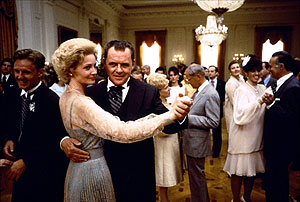 Oscar nomination for her performance who like Hopkins, went for a real character than an impersonation. Paul Sorvino nearly steals the film as Henry Kissinger, who was working his own agenda through advising the president. Sorvino is an underrated actor and this showcases the best of his talent.
Oscar nomination for her performance who like Hopkins, went for a real character than an impersonation. Paul Sorvino nearly steals the film as Henry Kissinger, who was working his own agenda through advising the president. Sorvino is an underrated actor and this showcases the best of his talent.
The narrative structure was interesting, considering this was a big-budget Hollywood production. We continually flash forward and back, fracturing conventional narrative that lets the audience piece together to see where the cracks began to appear in Nixon’s personality.
Nixon was Stone’s last solid film. It’s a film which we the audience have to make up our minds about a real-life figure whose rise to power and eventual fall was either from a man corrupted by the system, or ‘Beast’ as Stone refers to it, including the CIA, FBI and military which manipulates the government for its own needs, or that Nixon craved power too much that he turned himself into a villain. Nixon lives in the shadow of John F. Kennedy who was deemed the face of change in America. He believed he could never live up to Kennedy’s example.
One of the great moments is when he looks at a portrait of Kennedy and says to himself, “When they look at you, they see what they want to be. When they look at me, they see what they are”. He was paranoid, everyone was out to get him and wanted the public to love him. His policies in Vietnam created a counterculture that viewed him as a bogeyman. Nixon might not be for everyone and its three hour plus running time, which mainly consists on men talking in rooms, will put many off. Stone may never complete another work as concrete or as complex as this but it’s one of the best biopics and films of the ‘90s.
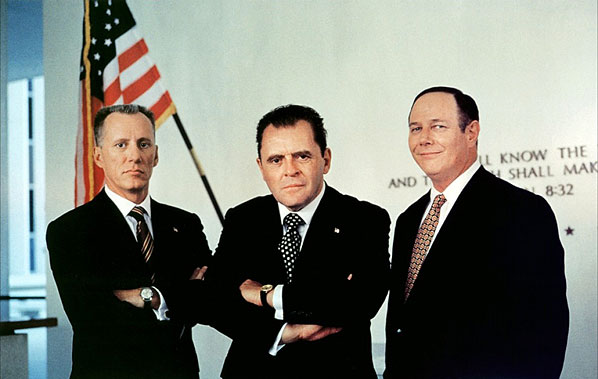

Kyle Barrett
Kyle Barrett is a PhD student at the University of the West of Scotland. His research focuses on digital film-making and current developments within national cinemas. He also writes and directs several short films and is currently working on the web series Ferocious Bloodaxe.
He also lectures and tutors on practical filmmaking classes.
© 2022 STATIC MASS EMPORIUM . All Rights Reserved. Powered by METATEMPUS | creative.timeless.personal. | DISCLAIMER, TERMS & CONDITIONS
HOME | ABOUT | CONTACT | TWITTER | GOOGLE+ | FACEBOOK | TUMBLR | YOUTUBE | RSS FEED
CINEMA REVIEWS | BLU-RAY & DVD | THE EMPORIUM | DOCUMENTARIES | WORLD CINEMA | CULT MOVIES | INDIAN CINEMA | EARLY CINEMA
MOVIE CLASSICS | DECONSTRUCTING CINEMA | SOUNDTRACKS | INTERVIEWS | THE DIRECTOR’S CHAIR | JAPANESE CINEMA





